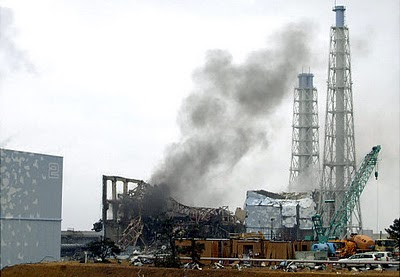
I wrote a letter to the Prime Minister of Japan about the Fukushima disaster. Much to my surprise, the Japan Times decided to publish it.
The letter appears in today's newspaper. You can read it here. I have also cut and pasted the letter below:
Dear Prime Minister Yoshihiko Noda,
The Tohoku earthquake and tsunami that devastated northeastern Japan continues to resonate far beyond its geographical borders for many reasons, but most of all because it exposed a deep fault line that runs through the global nuclear industry.
The twisted, charred reactors that sit on the Fukushima No. 1 site are a powerful symbol of both the literal and metaphorical damage to an industry that has long promoted nuclear power as a safe, reliable and clean source of energy.
The Fukushima disaster -- the worst of its kind since Chernobyl -- has shaken our assumptions about nuclear power, proving it is more unstable and dangerous than we thought. The disaster has also exposed the human arrogance that leads us to think we can somehow "outsmart" nature by building nuclear power plants as if they were unsinkable ships impervious to the rumblings of the earth and the movements of the ocean.
We forget that nature can't always be controlled or predicted, and so when a bigger-than-planned-for tsunami slams into a nuclear power plant, we are shocked to see the ugly mess left behind when the water recedes -- in this case, a series of equipment failures, nuclear meltdowns, the release of radioactive materials and the evacuation of tens of thousands of people from their homes. The tragedy is that we did this to ourselves.


If any good is to come of the Fukushima disaster, it is that it has sparked a worldwide debate about the future of nuclear power. Switzerland and Germany took quick, decisive action after the Fukushima crisis and announced their complete withdrawal from nuclear power in the coming decades. I'm pleased to hear that you plan to phase-out nuclear power too.
But what happens next is more complicated. Shutting down nuclear power plants will leave us with an energy supply gap that will have to be made up somehow. Will we invest in renewable energy or rely on increased imports of polluting fossil fuels? Will we attempt to reduce the demand for energy in the first place or continue to act as if the ground will never run out of oil?
Before the March 11 disaster, nuclear energy accounted for about 30 percent of Japan's power supply. Former Prime Minister Naoto Kan hoped to fill the majority of that gap with renewable energy by the early 2020s. You have said that reducing Japan's dependence on nuclear power will be a gradual process and that some reactors will have to be restarted.
In Germany, however, political leaders acted immediately to phase out nuclear power following the Tohoku disaster. The German government reversed its pronuclear stance and decided to abandon nuclear energy within 11 years. Eight of Germany's 17 nuclear reactors were taken off the grid after Fukushima. The German government has set a target to produce 35 percent of its energy from renewable sources by 2020.
But it's not enough to just address the supply of energy; we also need to look at how we can reduce that demand for energy in the first place. This will require a change in the way we think about energy and the way we live our lives.
Here in Japan, for example, there are more than 5.5 million vending machines. They guzzle electricity day and night to keep drinks hot and cool. But do we really need any of those vending machines? Do we really need to have their refrigerators and heaters running 24 hours a day, seven days a week for the sake of convenience?
How we use energy, how we produce energy -- it's all part of the discussion. I hope you will continue to keep Japan on its path of phasing out nuclear power. I also hope you will start thinking about safer, cleaner and more reliable alternatives.
If there is any good to come out of the Fukushima disaster, it is this.
SARAH MARCHILDON
Kyoto

No comments:
Post a Comment